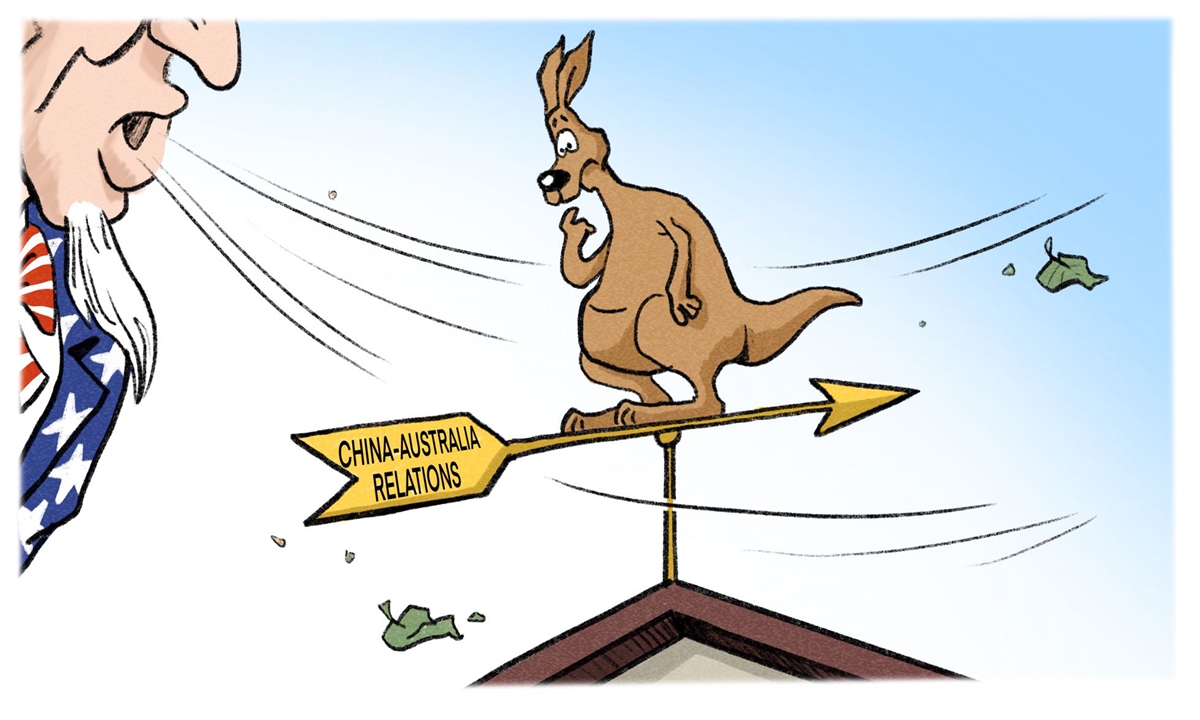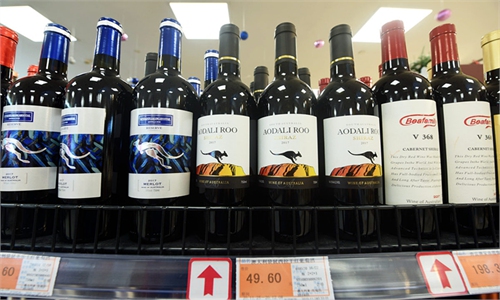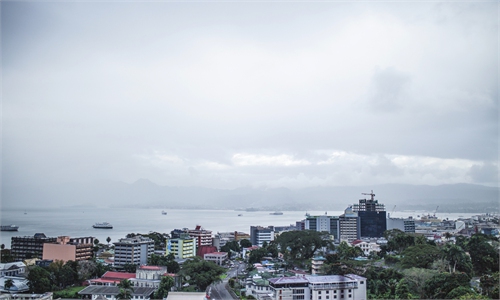
China-Australia relations. Illustration: Liu Rui/Global Times
While Australian wine producers are rejoicing over China's decision to lift anti-dumping and anti-subsidy tariffs on Australian wine, which signifies an improvement in trade relations and overall bilateral ties between the two countries, American media seem unable to hide its sour grape mentality.On Tuesday, VOA Chinese published an article claiming that Australia's compromise in principle is not worth the gain. Quoting some of the so-called observers with utterly no credibility to comment on international affairs, the media accused Australia of adopting an appeasement policy toward China in exchange for trade.
The article referenced a news story published on March 28, when China's Ministry of Commerce (MOFCOM) announced that China and Australia had reached a consensus on effectively resolving their trade disputes within the framework of the World Trade Organization (WTO), and that China had decided to lift anti-dumping duties and anti-subsidy tariffs levied on Australian wine, in keeping with shifting market conditions in the Chinese wine market, effective from March 29.
Australian Prime Minister Anthony Albanese issued a joint statement with his trade and agriculture ministers on Thursday welcoming the tariff removal. They said it ''comes at a critical time for the Australian wine industry" and both Australian producers and Chinese consumers will benefit from the re-entry of Australian wine into the Chinese market, adding that the removal "means that Australia will discontinue its legal proceedings at the WTO."
"China was Australia's most valuable export market in 2020, but a year later, anti-dumping tariffs effectively ended the lucrative trade," the Australian Broadcasting Corporation (ABC) reported in August 2023. China started to implement the tariffs in March 2021, during former prime minister Scott Morrison's administration. At that time, China-Australia relations reached a freezing point as Australia closely coordinated with US' anti-China strategy and acted as a vanguard against China.
After the test of time, Australia realized that its policy was irrational. In August 2023, The Guardian reported that at its peak in 2020, the export of Australian wine to China was valued at $1.2 billion and made up 18 percent of export volume and 40 percent of value. Now annual exports are worth just $8.1 million, contributing to a plummeting price for red varieties of grapes and a decline in domestic red wine prices. In that exact month, a Rabobank report articulated that Australia had the equivalent of 859 Olympic swimming pools of wine in storage.
Australia has been seeking alternative markets, including Malaysia, India, the UK and the US. However, these markets are relatively small and Canberra has seen slow growth rates there. In other words, those markets are unable to effectively address the issue of Australia's extensive wine inventory, Chen Hong, director of the Australian Studies Center of East China Normal University, told the Global Times.
Moreover, wine managers are noting that while they have less wine to sell, the cost of every part of the production, from bottles, caps, labels, cartons, fuel and wages, has risen.
According to MOFCOM, China was advancing the investigation process regarding the anti-dumping and countervailing tariffs on Australian wine in accordance with the law and pledged to fully safeguard the rights of all parties over the matter while making an objective, fair and just ruling.
The result is positive and beneficial to Australia's practical interests. Yet VOA's report ignores the problems facing the Australian economy. Not to mention, "appeasement" is a farfetched distortion. There are no grudges in history or conflicts of interest between China and Australia. It means there is nothing to appease between the two sides, Chen told the Global Times. As Australian Foreign Minister Penny Wong put it, "We want to continue to engage, to cooperate where we can and disagree where we must, and to manage these differences wisely." Likewise, China is also open to various levels of engagements and cooperation while Australia should not provoke the redline on China's sovereignty and territorial integrity, Chen added.
Analysts have said it may not be easy for Australia to regain its previous market share. After all, the global economic downturn affects people's consumption. In addition, when Australia's wine industry went through the cold winter, the export of wine from the US to China rose, taking up what previously was Australia's market share, according to media reports.
Now, with China-Australia relations improving and trade disputes resolved, VOA can't wait to smear China in an attempt to kidnap Australia morally. It mirrors that Washington wishes its allies to be brainless in the face of its gaslighting techniques, and continue irrational policies to show their obedience to the US, Shen Yi, a professor at Fudan University, told the Global Times.
Fortunately, Australia still has strategic wisdom. Improving relations with China and eliminating sour points and blockages in trade between the two countries is a realistic choice for the Albanese government. Although China-Australia relations may not any time soon return to the era of Paul Keating and Kevin Rudd, Australia's gradual return to a rational and pragmatic approach to China means the two sides have greater room for more cooperation, a good chance to walk out of the cold winter and jointly step into the warm spring.


